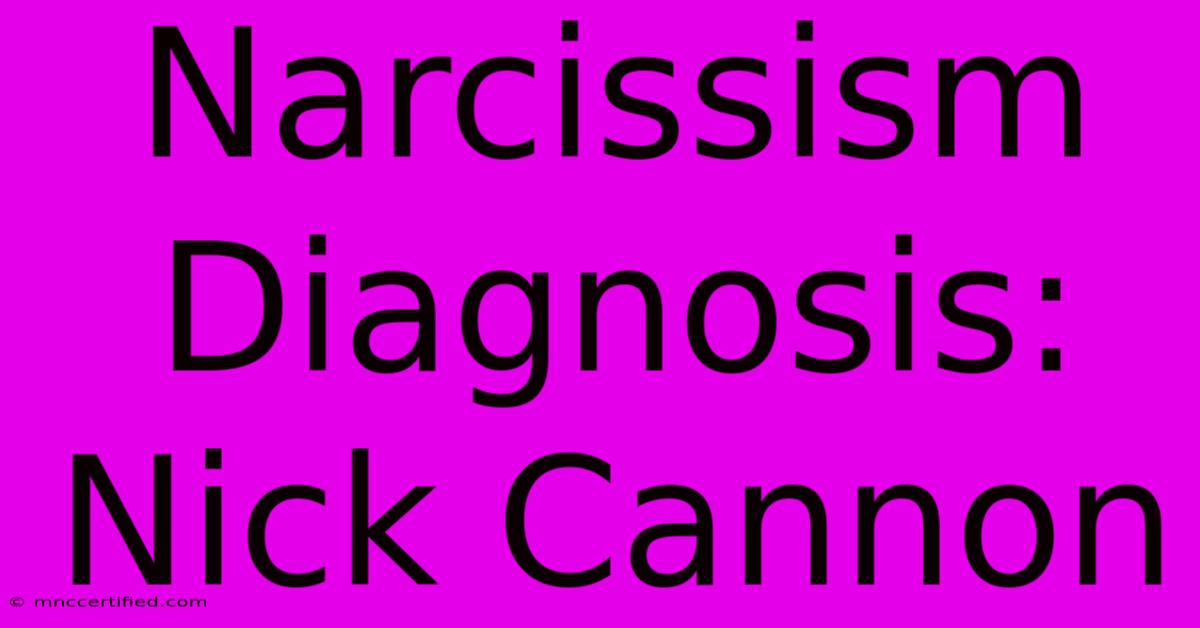Narcissism Diagnosis: Nick Cannon

Table of Contents
Narcissism Diagnosis: Nick Cannon – A Speculative Exploration
The internet is rife with speculation regarding Nick Cannon's personality. Many online discussions label him as narcissistic, citing his numerous children, public pronouncements, and sometimes controversial behavior. However, it's crucial to understand that a diagnosis of Narcissistic Personality Disorder (NPD) can only be made by a qualified mental health professional after a thorough assessment. This article explores the public perception of Nick Cannon and the common characteristics of NPD, emphasizing the importance of avoiding armchair diagnoses.
Understanding Narcissistic Personality Disorder (NPD)
Narcissistic Personality Disorder is a complex personality disorder characterized by a pervasive pattern of grandiosity, need for admiration, and lack of empathy. Individuals with NPD often exhibit several key traits, including:
- Grandiose sense of self-importance: They exaggerate achievements and talents, expecting to be recognized as superior without commensurate achievements.
- Preoccupation with fantasies of unlimited success, power, brilliance, beauty, or ideal love: Their thoughts often revolve around idealized versions of themselves and their future.
- Belief that they are "special" and unique and can only be understood by, or should associate with, other special or high-status people (or institutions): They feel entitled to special treatment and privileges.
- Need for excessive admiration: They require constant praise and validation.
- Sense of entitlement: They expect preferential treatment and compliance with their expectations.
- Interpersonally exploitative: They take advantage of others to achieve their own ends.
- Lack of empathy: They are often insensitive to the feelings and needs of others.
- Envious of others or believes that others are envious of them: They harbor resentment towards those they perceive as more successful.
- Arrogant, haughty behaviors or attitudes: They display a condescending and superior demeanor.
It is vital to remember that these traits must be pervasive and persistent across various contexts to constitute a diagnosis of NPD. Observing a few of these characteristics in someone's public persona does not automatically equate to a clinical diagnosis.
Nick Cannon and Public Perception
Nick Cannon's public life has provided ample material for discussion and speculation regarding his personality. His prolific family, outspoken nature, and sometimes controversial statements have fueled online debates about whether he exhibits narcissistic traits. However, these observations are based on limited information and lack the depth of a professional assessment.
Some might point to his numerous children as evidence of a sense of entitlement or a need for excessive admiration. Others may cite his public pronouncements and controversies as examples of a lack of empathy or exploitative behavior. However, interpreting such behaviors requires careful consideration of the context, motivations, and individual circumstances.
The Dangers of Online Diagnoses
It's crucial to emphasize the serious ethical and practical concerns associated with diagnosing public figures based solely on media portrayals. Online speculation can be harmful, leading to stigmatization and misrepresentation of mental health conditions. Furthermore, self-diagnoses and armchair diagnoses are unreliable and can prevent individuals from seeking professional help if they genuinely require it.
Instead of engaging in speculation, it's essential to respect individuals' privacy and avoid making assumptions about their mental health. If you are concerned about your own mental health or the mental health of someone you know, seek help from a qualified mental health professional.
Conclusion: Focus on Facts, Not Speculation
While public figures' behavior may invite discussion and interpretation, it's imperative to avoid making diagnoses based on limited information and public perception. Understanding the complexities of NPD and the ethical considerations surrounding diagnosing individuals based on limited data is crucial. Focus on respecting individuals' privacy and promoting responsible discussions about mental health. If you have concerns about your own mental health, seek professional help. Remember, only a qualified professional can provide an accurate diagnosis of Narcissistic Personality Disorder.

Thank you for visiting our website wich cover about Narcissism Diagnosis: Nick Cannon. We hope the information provided has been useful to you. Feel free to contact us if you have any questions or need further assistance. See you next time and dont miss to bookmark.
Featured Posts
-
Watch Ole Miss Vs State Football Online Free
Nov 30, 2024
-
Patrick Mahomes Passes Len Dawson
Nov 30, 2024
-
Championship Sheffield Utd Sunderland Live
Nov 30, 2024
-
Transport Secretary Haigh Steps Down
Nov 30, 2024
-
Cannon Opens Up About Npd
Nov 30, 2024